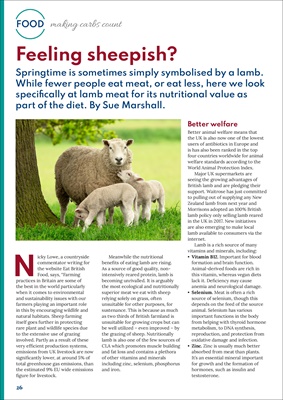
26
FOOD making carbs count
Feeling sheepish?
Springtime is sometimes simply symbolised by a lamb.
While fewer people eat meat, or eat less, here we look
specifically at lamb meat for its nutritional value as
part of the diet. By Sue Marshall.
Nicky Lowe, a countryside
commentator writing for
the website Eat British
Food, says, "Farming
practices in Britain are some of
the best in the world particularly
when it comes to environmental
and sustainability issues with our
farmers playing an important role
in this by encouraging wildlife and
natural habitats. Sheep farming
itself goes further in protecting
rare plant and wildlife species due
to the extensive use of grazing
involved. Partly as a result of these
very efficient production systems,
emissions from UK livestock are now
significantly lower, at around 5% of
total greenhouse gas emissions, than
the estimated 9% EU wide emissions
figure for livestock.
Meanwhile the nutritional
benefits of eating lamb are rising.
As a source of good quality, nonintensively
reared protein, lamb is
becoming unrivalled. It is arguably
the most ecological and nutritionally
superior meat we eat with sheep
relying solely on grass, often
unsuitable for other purposes, for
sustenance. This is because as much
as two thirds of British farmland is
unsuitable for growing crops but can
be well utilized - even improved - by
the grazing of sheep. Nutritionally
lamb is also one of the few sources of
CLA which promotes muscle building
and fat loss and contains a plethora
of other vitamins and minerals
including zinc, selenium, phosphorus
and iron.
Better welfare
Better animal welfare means that
the UK is also now one of the lowest
users of antibiotics in Europe and
is has also been ranked in the top
four countries worldwide for animal
welfare standards according to the
World Animal Protection Index.
Major UK supermarkets are
seeing the growing advantages of
British lamb and are pledging their
support. Waitrose has just committed
to pulling out of supplying any New
Zealand lamb from next year and
Morrisons adopted an 100% British
lamb policy only selling lamb reared
in the UK in 2017. New initiatives
are also emerging to make local
lamb available to consumers via the
internet.
Lamb is a rich source of many
vitamins and minerals, including:
• Vitamin B12. Important for blood
formation and brain function.
Animal-derived foods are rich in
this vitamin, whereas vegan diets
lack it. Deficiency may cause
anemia and neurological damage.
• Selenium. Meat is often a rich
source of selenium, though this
depends on the feed of the source
animal. Selenium has various
important functions in the body
from helping with thyroid hormone
metabolism, to DNA synthesis,
reproduction, and protection from
oxidative damage and infection.
• Zinc. Zinc is usually much better
absorbed from meat than plants.
It's an essential mineral important
for growth and the formation of
hormones, such as insulin and
testosterone.